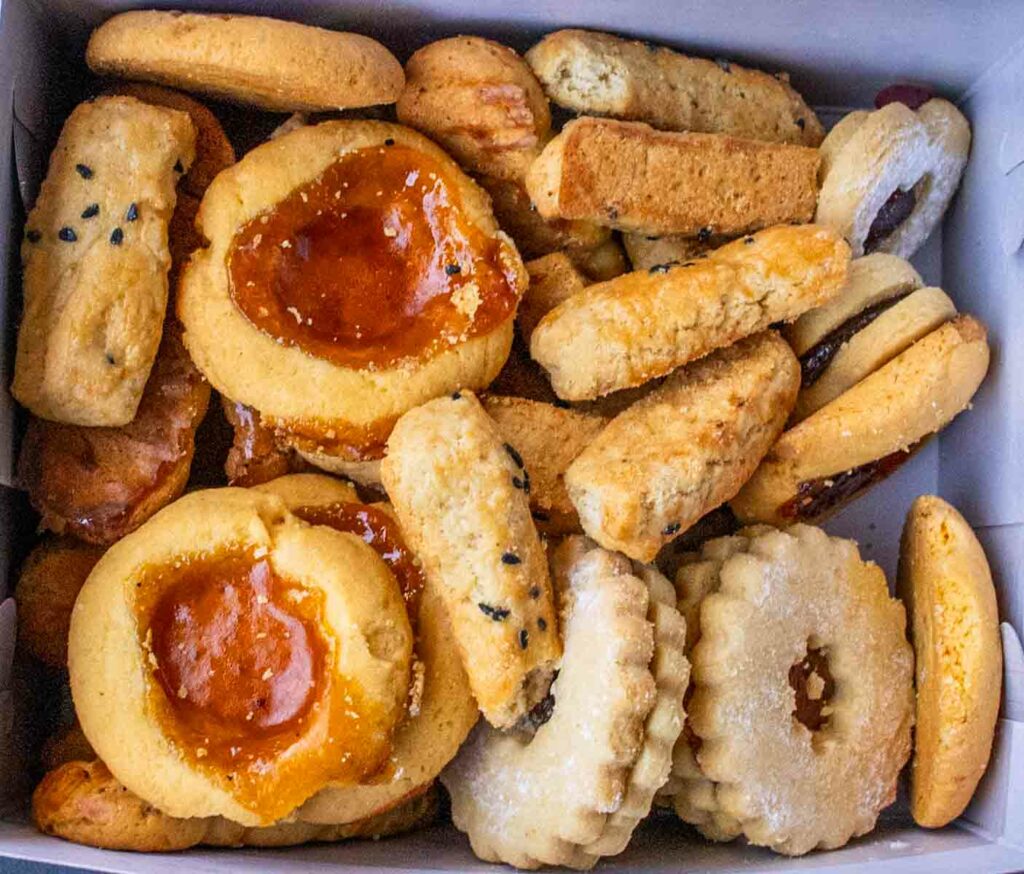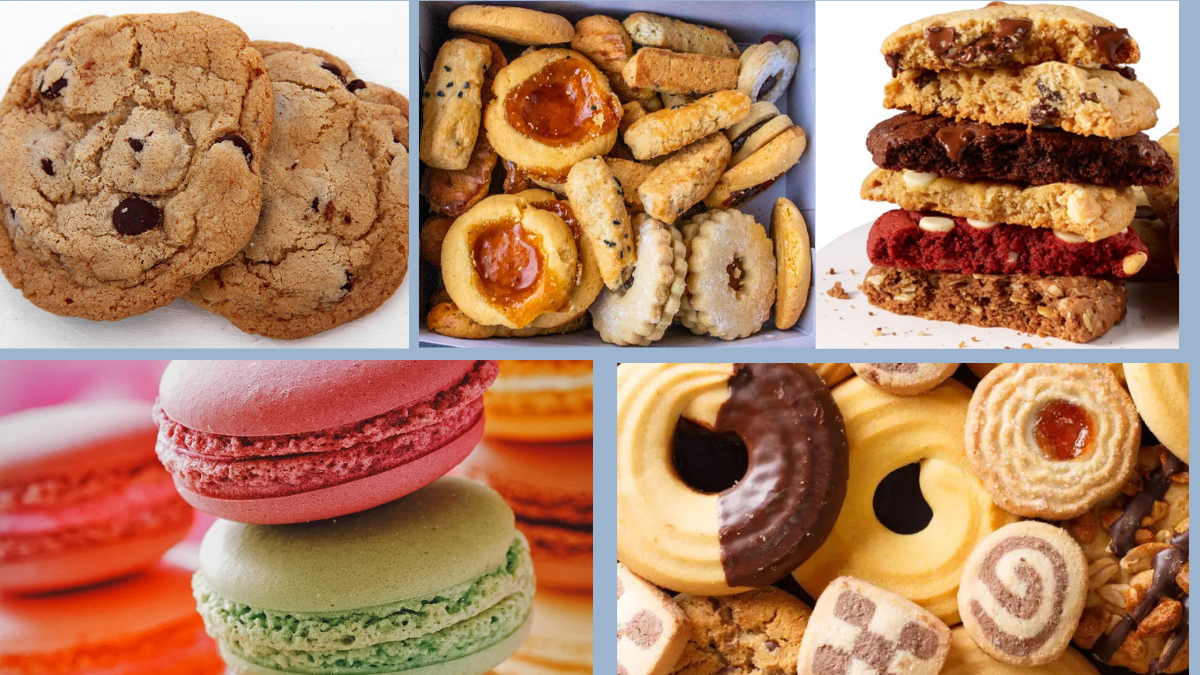Introduction: The Universal Love for Cookies
From crispy chocolate chips to soft-baked oatmeal raisin, cookies are one of the most beloved treats worldwide. Their simplicity, versatility, and ability to be customized make them a favorite across cultures and age groups. But among all the cookie-loving countries, which nation tops the list in consumption?
This article uncovers the global cookie phenomenon and reveals which country eats the most cookies—all while exploring how vegetarian and plant-based cookie recipes are reshaping the baking world.
The United States: The Cookie Capital of the World

Cookie Culture in America
It’s no surprise that the United States leads the world in cookie consumption. From childhood lunchboxes to Christmas cookie platters, cookies are deeply embedded in American culture. On average, Americans eat over 300 cookies per person per year. That’s nearly one cookie a day!
Look at the Numbers
- The U.S. cookie market is valued at $10 billion+ annually, with brands like Oreo, Chips Ahoy!, and Pepperidge Farm dominating shelves.
- Homemade cookies also remain a staple in American homes—especially during holidays and celebrations.
- Over 25% of all U.S. baked goods sold are cookies, far outpacing cakes and pies.
Iconic American Cookies

- Chocolate Chip Cookies: Invented in the 1930s in Massachusetts, these are the classic go-to.
- Peanut Butter Cookies: Dense, crumbly, and protein-rich—especially great for vegetarians.
- Snickerdoodles: Coated in cinnamon sugar, offering warmth and comfort in every bite.
- Oatmeal Raisin Cookies: Packed with fiber and naturally vegetarian.
Today, many of these classics are easily made using plant-based or egg-free variations without losing taste or texture.
Cookies Across the Globe
While the U.S. dominates in volume, many other countries have rich cookie traditions and growing cookie cravings.
United Kingdom – “Biscuits,” Not Cookies
In the UK, cookies fall under the broader term “biscuits.” Popular varieties include digestives, Jammie Dodgers, and Hobnobs. Though per capita consumption is lower than in the U.S., Brits enjoy cookies regularly with tea. Many popular UK biscuit brands now offer eggless and vegan-friendly versions.
Canada
Canadians share a similar cookie culture with the U.S., enjoying both store-bought and homemade varieties. Notably, maple-flavored cookies and butter cookies are uniquely Canadian. Vegetarian and vegan options are growing in grocery aisles and cafes.
India
India’s booming middle class has fueled a massive rise in cookie consumption. Brands like Parle-G and Britannia dominate the market with eggless recipes, catering to the country’s largely vegetarian population. Spiced cookies with cardamom, fennel, or cumin are also popular.
Australia
Aussies love their ANZAC biscuits—a chewy cookie made with oats and golden syrup (typically egg-free). Cookie cafés and bakeries across Australia are now offering plant-based options to meet growing demand.
The Rise of Vegetarian & Vegan Cookies

Cookies are incredibly adaptable to plant-based baking. With a few smart swaps, even traditional recipes can become 100% vegetarian or vegan-friendly.
Common Substitutions:
- Eggs: Replaced with flaxseed meal, mashed bananas, applesauce, or commercial egg replacers.
- Butter: Swapped with vegan margarine, coconut oil, or nut butters.
- Milk (if used): Replaced with almond, oat, or soy milk.
These tweaks not only maintain flavor and texture but also cater to those avoiding dairy, eggs, or animal byproducts for ethical, religious, or health reasons.
Popular Vegetarian Cookie Trends
- Almond Flour Cookies
High in protein and gluten-free, these cookies are rich and chewy, often sweetened naturally with maple syrup. - Tahini Cookies
Sesame paste adds a nutty flavor and healthy fats. These are popular in Middle Eastern-inspired diets and often made without eggs. - Coconut Oat Cookies
With just oats, shredded coconut, and plant-based syrup, these cookies are quick, wholesome, and egg-free. - No-Bake Energy Cookies
Often made with dates, cocoa, and nuts—perfect for hot climates or quick snacks. - Chickpea Chocolate Chip Cookies
Blended chickpeas provide protein and creaminess. These cookies are trending in health circles and are 100% vegetarian.
Cookies for Every Diet

Cookies are perhaps the most inclusive dessert in the world. Here’s why:
| Dietary Need | Cookie Adaptation |
|---|---|
| Vegetarian | No eggs or gelatin used |
| Vegan | Egg-free, dairy-free versions common |
| Gluten-Free | Use almond, oat, or rice flour |
| Sugar-Free/Keto | Sweetened with stevia, monk fruit, or dates |
| Nut-Free | Made with sunflower seed butter or tahini |
Homemade Cookies: Plant-Based Ideas You’ll Love
1. Vegan Double Chocolate Cookies
Made with flax eggs and dark cocoa, these cookies are rich and indulgent—without the need for dairy or eggs.
2. Peanut Butter Banana Cookies
Just three ingredients: ripe banana, peanut butter, and oats. Great for breakfast or guilt-free snacking.
3. Oatmeal Cranberry Cookies
Sweet and tart, these use rolled oats, coconut oil, and dried cranberries. Perfect with a cup of tea.
4. Lemon Poppy Seed Shortbread
A bright twist on classic shortbread using plant-based butter and a splash of lemon zest.
Cookie Industry and Future Trends

The global cookie market is expected to reach over $45 billion by 2030, fueled by:
- Health-conscious snacking
- Plant-based baking trends
- Customizable and functional ingredients (like added protein or fiber)
Large brands like Oreo have launched vegan versions globally. Meanwhile, small bakeries and home bakers continue to innovate with new textures, superfoods, and sugar alternatives.
Fun Cookie Facts
- The largest cookie ever baked weighed over 40,000 pounds and was created in North Carolina, USA.
- December 4th is National Cookie Day in the U.S.
- Oreo, the world’s best-selling cookie, is entirely plant-based in most countries.
Final Verdict: Who Wins the Cookie Crown?
After looking at the data, it’s clear:
The United States eats the most cookies in the world.
With over 2 billion cookies consumed annually and a love that spans generations, the U.S. stands as the cookie champion. But thanks to globalization, health trends, and plant-based lifestyles, cookies are becoming more diverse and inclusive than ever before.
Conclusion: A Sweet Treat for All
Cookies may be simple, but they’re powerful. They connect us to childhood memories, cross cultural borders, and adapt beautifully to all kinds of diets—including vegetarian and plant-based. Whether you’re in New York, New Delhi, or Newcastle, a warm cookie brings the same joy.
So the next time you bite into a chocolate chip or almond oat cookie, remember: you’re part of a global love story—one delicious crumb at a time.
